Who gets elected really really matters (and who gets elected in Maryland and Virginia matters to DC)
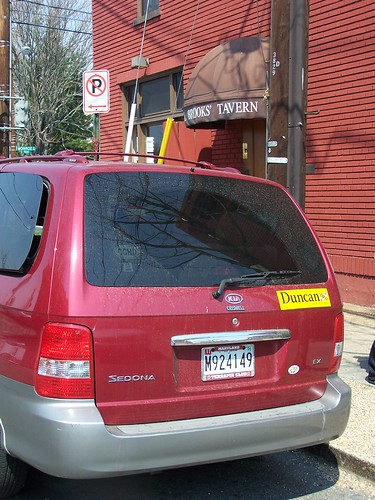 A Doug Duncan for Governor bumper sticker spied in Brookland.
A Doug Duncan for Governor bumper sticker spied in Brookland. As I say from time to time, I never expected to write so much about Maryland and Virginia in the context of DC, but of course, that's what regionalism is all about. Certainly, the impact of change in governorship in Maryland made a huge difference as the "smart growth" and pro-transit agenda of former Governor Glendening appears to have been branded a "Democrat" agenda rather than a "sustainable land use and resource planning" agenda that transcended party labels.
With Glendening you had a strong "smart growth" movement, in large part out of his recognition that both local as well as the state government are tagged with huge infrastructure costs as a result of sprawl. At Glendening's initiative, the Blue line subway was extended by two stations, and there were a variety of other more compact development projects.
The major initiative of the Ehrlich Administration has been a toll road through Montgomery and Prince George's Counties, and a slowdown of transit expansion planning in the Maryland portion of the DC region, and seem seemingly anti-transit appointees on the WMATA Board.
Because of Doug Duncan's wholehearted support of the Toll Road, it's likely that if I could vote in Maryland, it would be for O'Malley. After all, dealing with the issues of a declining center city, Baltimore, is ten times harder than working with the great demographics and opportunities of Montgomery County. (Plus I don't like Duncan's more urban-renewal orientation towards revitalization, although he is a primary proponent of arts and culture as a revitalization strategy and that's a good thing.)
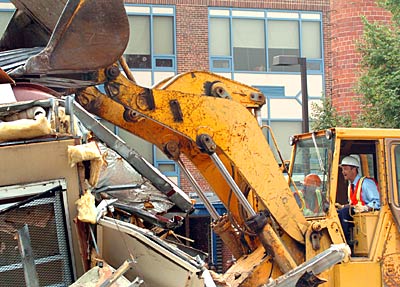 Mayor Martin O'Malley, seated at the controls of a bulldozer, kicks off his Believe in Our Schools campaign at Harbor City High, where unsightly vacant trailers had become home to crime. (Sun photo by Doug Kapustin) Jun 22, 2004.
Mayor Martin O'Malley, seated at the controls of a bulldozer, kicks off his Believe in Our Schools campaign at Harbor City High, where unsightly vacant trailers had become home to crime. (Sun photo by Doug Kapustin) Jun 22, 2004.Anyway, Friday's Baltimore Sun reports on the very anemic "Priority Places" (Ehrlich's non-Glendening term for "Smart Growth") initiative in "Funding slows for redevelopment projects:
Preservation advocates say Ehrlich has not fulfilled a promise to focus on revitalization."
My short response to the "preservation advocates" is that Ehrlich's agenda is very clear and it's not asset-based revitalization of extant places like center cities and inner ring suburbs, but the development of greenfields (cf. earlier proposals to sell off state-owned lands for development, etc.--although the proposed redevelopment of the Maryland State Center in Baltimore, initiated in large part by the State of Maryland, is an intelligent step forward...)
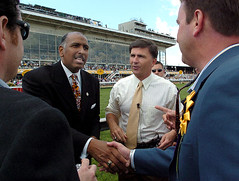 Gov. Robert Ehrlich (right) and Lt. Gov. Michael Steele await the start of the 130th Preakness Stakes.(Sun photo by Lloyd Fox) May 21, 2005
Gov. Robert Ehrlich (right) and Lt. Gov. Michael Steele await the start of the 130th Preakness Stakes.(Sun photo by Lloyd Fox) May 21, 2005Speaking of Michael Steele, a Republican candidate for the U.S. Senate, the New York Times Magazine had a feature story about him a couple weeks ago. From the article:
...then the crowd piled into a Wicomico County school bus for a tour highlighted by a stop at the town's sewage-treatment plant. (Small-town politics is largely about development, and development is largely about the capacity of the treatment plant.)
The interesting thing about this from a structured perspective is that at the state level Governor Ehrlich is doing what the Bush Administration is doing at the federal level. Center cities, traditionally voting Democratic, are finding that year after year, the Administration proposes to cut federal programs of particular usefulness to cities (Cutting HUD programs, etc.). Governor Ehrlich's proposals tend to support the Republican base.
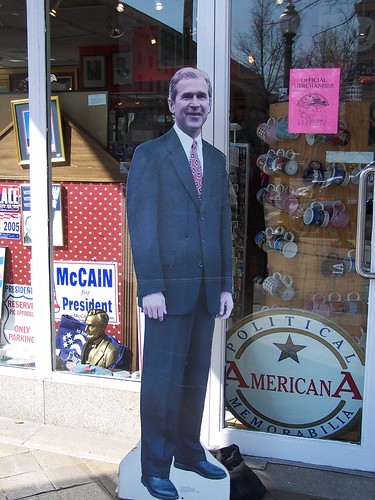 In front of the Political Memorabilia store at 14th and E Streets NW.
In front of the Political Memorabilia store at 14th and E Streets NW.I do truly believe that sustainable land use and resource planning (my preferred term) transcends politics. If you don't believe it, go check out the "Agricultural Preserve" in upper Mongtomery County.
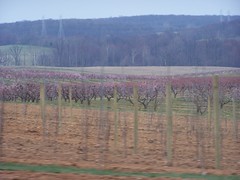 Somewhere on Darnestown Road, Agricultural Preserve, Montgomery County, Maryland.
Somewhere on Darnestown Road, Agricultural Preserve, Montgomery County, Maryland.Index Keywords: politics; growth-machine



0 Comments:
Post a Comment
<< Home